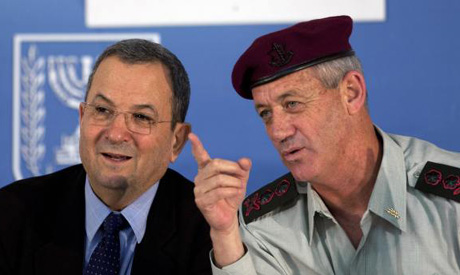
Israel's Defense Minister Ehud Barak with the new Israeli Chief of Staff (Reuters)
Israel's defence minister said Monday that his country would be ready to talk peace with Syria if Damascus were serious about doing so -- a sharp departure from Prime Minister Benjamin Netanyahu's go-slow approach to peacemaking as long as the Middle East is in turmoil .
Defence Minister Ehud Barak said Israel must look beyond the risks arising from the changes sweeping the Middle East, where long-time autocrats in Tunisia and Egypt have been toppled and the 42-year dictatorship of Libya's Muammar Gaddafi is under assault from opposition forces.
Barak acknowledged that the revolts might have negative implications for Israel, because it is not clear what form of government Egyptians will choose and whether Mubarak's successor will be as committed to the three-decade-old peace treaty with the Israeli state as he was.
Still, he said, Israel must see the changes as an opportunity to move peacemaking forward -- including possible talks with Syria.
"The Syrians are signalling, in more than one way, that they are willing to consider an accord," Barak said. "I think that we have to explore every opportunity. ... If it turns out that the Syrian president really means it and is seriously exploring the possibility, with the understanding that peace is a mutual thing, then he will find us ready to talk."
Barak did not say what signals Syria might be sending, and Syrian President Bashar Assad has not spoken about the issue in public in recent days. But Israeli newspapers have reported that Assad has expressed interest in restarting peace talks in recent discussions with visiting American senators.
Syria, which borders northeast Israel, is one of the entity’s most bitter enemies, through its alliance with Iran and by offering support to anti-Israel resistance groups Hamas and Hezbollah.
In exchange for peace, Syria wants Israel to return land captured in the 1967 Mideast war -- the strategic Golan Heights and small areas of land that adjoin the Sea of Galilee, a main water source for Israel.
Netanyahu has balked at a full withdrawal from the Golan, a Syrian plateau overlooking northern Israel -- a deal-breaker for the Arab state.
The prime minister's spokesman, Mark Regev, said Barak was speaking on behalf of the government when he signalled to Syria that Israel was prepared to conduct serious negotiations.
Israel and Syria held several rounds of Turkish-mediated negotiations in 2008, and those talks were to have progressed to direct negotiations in December 2008. But Israel launched a war against Palestinian resistance in the Gaza Strip that month, and the talks fell apart.
Netanyahu has said little positive about the crumbling of authoritarian regimes in the Middle East, instead warning that Mubarak's departure could usher in a fundamentalist Islamist regime.
He also has appeared cool to the idea of moving quickly to reach a peace accord with the Palestinians at a time of such great regional uncertainty.
Barak told Israel Radio that he does not see a radical Islamist movement arising in Egypt at this point or any immediate military threat to Israel coming from Egypt.
The Egyptian military is leading a caretaker government; promising democratic elections later this year.
Short link: